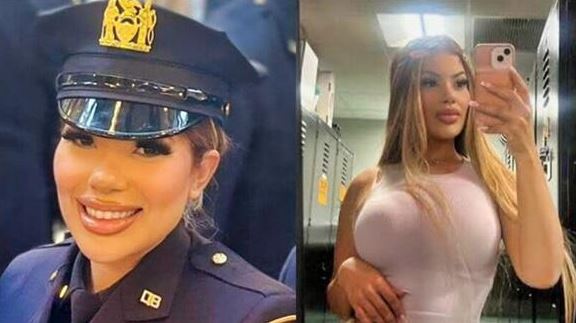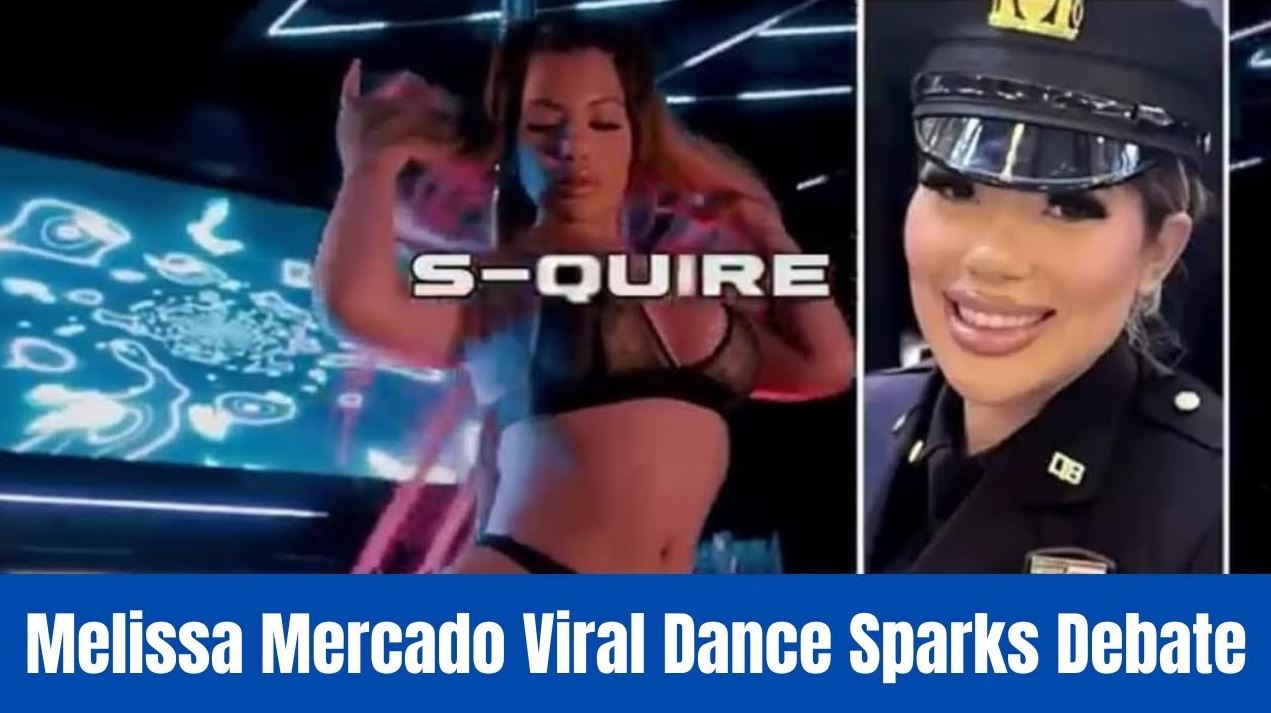Melissa Mercado Video Leaked Poldance
The recent controversy surrounding NYPD Detective Melissa Mercado has garnered significant public attention following the leak of a video featuring her pole dancing. The video, originally recorded as part of a music project, quickly went viral, raising questions about personal freedom, professional ethics, and the blurred lines between private and public life. Mercado, a dedicated officer serving in the Special Victims Unit, was caught in a storm of criticism and support after the video surfaced on social media platforms.
In an era where digital privacy is increasingly compromised, this incident underscores the vulnerability of personal content once it enters the public domain. Many have debated whether an off-duty officer engaging in a form of dance, often associated with fitness and self-expression, should be subjected to scrutiny. While some argue that law enforcement officers should uphold a certain public image even in their private lives, others believe that Mercado’s actions do not warrant professional repercussions.
The controversy also brings to light the role of social media in shaping public perception. The video’s rapid spread and the resulting discourse highlight the challenges faced by professionals in high-profile careers who wish to engage in personal activities without fear of backlash. Furthermore, it raises concerns about how women in traditionally male-dominated fields are judged differently when it comes to their private choices.
This discussion is not merely about a leaked video; it delves into deeper societal issues, including the right to personal expression, the expectations placed on law enforcement officers, and the consequences of viral internet culture. As the NYPD responds to the situation, many are eager to see whether Mercado will face disciplinary action or if this incident will prompt discussions about modern policing standards and personal freedom.
The following sections will explore the background of Melissa Mercado, details of the leaked video, the public and media reaction, the NYPD’s response, legal and ethical considerations, and the broader implications for her career and law enforcement as a whole. Through this analysis, we can better understand the intersection of personal expression and professional responsibility in an age where privacy is increasingly fragile.
Background on Melissa Mercado
Melissa Mercado is a detective with the New York Police Department (NYPD), known for her work in the Special Victims Unit. As a law enforcement officer, she has dedicated years to serving and protecting the community, particularly in cases involving sensitive investigations related to sexual crimes and domestic violence. Her role requires a high level of professionalism, discretion, and commitment to justice. Before the controversy surrounding her leaked pole-dancing video, she was regarded as a competent and respected member of the force.
Despite the expectations placed on police officers, Mercado, like anyone else, has a personal life outside of her professional duties. She has expressed an interest in fitness, dance, and self-expression, which eventually led to her participation in a pole-dancing performance. Pole dancing, often misunderstood, is not just a form of entertainment but also a recognized fitness activity requiring strength, agility, and discipline. Many athletes and dancers worldwide practice it as an art form and as a means of physical training.
Mercado’s involvement in the music video featuring her pole-dancing performance was not intended to become a point of controversy. Rather, it was a personal and artistic endeavor. However, when the footage leaked, the public response quickly shifted from appreciation of her talent to debate over whether such an activity was appropriate for an NYPD officer.
Her case is particularly interesting because it highlights the double standards applied to professionals in law enforcement. Male officers engaging in off-duty activities, such as bodybuilding competitions or extreme sports, often receive admiration for their discipline and dedication. In contrast, Mercado’s decision to partake in pole dancing—despite its widespread acceptance as a fitness discipline—has sparked criticism that seems rooted in outdated stereotypes.
Before this controversy, Mercado maintained a relatively low profile in the media. She was recognized for her contributions to law enforcement rather than for any public or social media presence. This sudden exposure has now placed her at the center of an ongoing debate about personal freedom, professional responsibility, and gender expectations within law enforcement.
As the situation continues to unfold, many are watching closely to see how both the NYPD and the public will ultimately respond to the controversy. Will Mercado’s career be affected by this incident, or will this case prompt a reevaluation of how police officers’ private lives are judged?
Details of the Leaked Video
The leaked video that propelled Detective Melissa Mercado into the public eye features her engaging in a pole-dancing routine. The footage was originally filmed as part of a music video for rapper S-Quire, a project that Mercado willingly participated in during her personal time. In the video, she is seen performing a series of acrobatic and artistic pole-dancing moves, showcasing athleticism and skill. The setting of the video is a typical performance space, with ambient lighting and a professional aesthetic that aligns with many contemporary music videos.
Pole dancing, once solely associated with exotic entertainment, has evolved into a widely recognized form of fitness and artistic performance. It requires strength, flexibility, and discipline—qualities that Mercado demonstrates in the footage. However, despite the increasing mainstream acceptance of pole dancing as a sport and an art form, its historical associations have fueled criticism against Mercado, particularly given her role as a law enforcement officer.
The circumstances of how the video was leaked remain unclear. Some reports suggest that it was intentionally released to the public, while others speculate that it was shared without Mercado’s consent. Regardless of the origin, once the footage began circulating on social media, it quickly gained traction, drawing mixed reactions from viewers.
Supporters argue that Mercado was simply engaging in a personal activity that should not reflect negatively on her professional standing. Many have pointed out that police officers, like anyone else, are entitled to personal hobbies and creative outlets. On the other hand, critics contend that her participation in the video might undermine the perceived integrity of law enforcement professionals, especially those working in sensitive departments like the Special Victims Unit.
As the video continued to spread, media outlets picked up the story, further amplifying the debate. Some news organizations presented the incident as a scandal, while others framed it as an example of unnecessary public scrutiny over a private matter. The NYPD’s reaction to the leaked footage would become a key factor in determining how the situation would unfold for Mercado.
The controversy surrounding the video highlights the challenges faced by professionals in high-profile careers when engaging in personal activities. In an era where digital content can be rapidly disseminated, maintaining a clear boundary between personal expression and professional expectations has become increasingly difficult. The following sections will explore the broader impact of this incident, including public reactions, official responses, and its implications for Mercado’s career.
Public and Media Reaction
The public and media response to the leaked video of NYPD Detective Melissa Mercado has been divided, reflecting broader societal attitudes toward personal freedom, professional conduct, and gender norms. Once the video surfaced online, it quickly became a topic of debate across social media platforms, with opinions ranging from support and admiration to criticism and moral outrage.
Many people defended Mercado, arguing that her participation in a pole-dancing performance was a personal choice that should not affect her professional standing. Supporters emphasized that pole dancing is a recognized fitness discipline that requires athleticism and dedication. They pointed out that other professionals, including athletes and celebrities, have openly embraced pole dancing without facing the same level of scrutiny. Furthermore, many expressed frustration that female officers often face harsher judgment for their personal activities compared to their male counterparts.
On the other hand, critics viewed the video as inappropriate for someone in Mercado’s position. Some argued that law enforcement officers are held to higher standards of professionalism, even in their private lives, and that engaging in pole dancing—especially in a music video—could be seen as conflicting with the serious nature of her work in the Special Victims Unit. Certain conservative voices within the media suggested that the video might damage the reputation of the NYPD, calling into question whether Mercado should face disciplinary action.
News outlets quickly picked up the story, further fueling the controversy. Some reported on the incident in a neutral or supportive manner, highlighting the unfair scrutiny placed on women in law enforcement. Others sensationalized the event, portraying it as a scandal and questioning Mercado’s professionalism. The rapid spread of the video and the subsequent discourse underscored the power of social media in shaping public perception and influencing institutional responses.
Additionally, discussions about privacy rights and digital ethics emerged. Many questioned whether Mercado had consented to the video being shared publicly and whether it was fair for her career to be impacted by a personal activity. The controversy has reignited debates about the extent to which professionals—especially those in government or law enforcement—should be scrutinized for their personal choices outside of work.
As the NYPD began to address the situation, both supporters and critics awaited an official response, which would ultimately determine whether Mercado’s career would be affected by the leaked footage.
NYPD’s Response and Actions Taken
Following the public uproar over the leaked video, the New York Police Department faced pressure to address the situation. Given Mercado’s role in the Special Victims Unit, an internal review was initiated to assess whether her participation in the pole-dancing video violated any department policies.
Initial reports suggested that the NYPD had placed Mercado under investigation, a standard procedure when an officer becomes involved in a public controversy. The department’s leadership was likely considering factors such as whether Mercado had violated any codes of conduct, misrepresented the NYPD, or engaged in any activities that could undermine public trust in the police force.

While some within the NYPD may have viewed the video as a minor issue, others likely saw it as a potential public relations concern. Law enforcement agencies often prioritize maintaining a professional image, and the idea of an officer appearing in a pole-dancing performance—even outside of work—was bound to generate debate. However, given the increasing recognition of pole dancing as a legitimate fitness and artistic activity, punishing Mercado too harshly could have led to backlash from both the public and civil rights organizations.
Amid the controversy, police unions and advocacy groups weighed in on the discussion. Some unions expressed support for Mercado, arguing that officers have a right to personal lives and that the department should not police an officer’s off-duty activities unless they directly interfere with their work. Meanwhile, critics within law enforcement circles debated whether her actions might have compromised her ability to serve effectively in sensitive cases.
As the investigation continued, the NYPD faced a crucial decision: whether to discipline Mercado, let the matter go, or implement new policies regarding officers’ personal conduct in public settings. The outcome of the case would not only impact Mercado’s career but could also set a precedent for how law enforcement agencies handle similar situations in the future.
Legal and Ethical Considerations
The controversy surrounding Melissa Mercado’s leaked pole-dancing video raises several legal and ethical questions about personal privacy, professional conduct, and workplace policies. One of the key legal considerations is whether Mercado’s rights were violated when the video was leaked. If the footage was shared without her consent, it could constitute a breach of privacy or even grounds for legal action against those responsible for its dissemination.
From an ethical standpoint, the case highlights the double standards often applied to women in law enforcement. Male officers engaging in off-duty activities that involve physical fitness or artistic expression rarely face the same scrutiny as women. The criticism directed at Mercado suggests that outdated gender norms continue to influence perceptions of what is deemed “acceptable” behavior for female officers.
Another important factor is the NYPD’s code of conduct. Most law enforcement agencies have policies regarding off-duty behavior, especially when it comes to public appearances. However, these policies must balance the need for professionalism with an officer’s right to a private life. If Mercado did not violate any specific department regulations, disciplinary action against her could be viewed as unjust or even discriminatory.

The ethical debate also extends to the role of social media in shaping public perceptions of law enforcement. In today’s digital age, any content—whether leaked intentionally or shared privately—can quickly become public. This raises concerns about how professionals in high-profile careers should navigate their personal lives in an era where privacy is increasingly difficult to maintain.
Furthermore, the issue of workplace culture within the NYPD comes into question. If Mercado faces disciplinary action for her involvement in the video, it may suggest that the department has an inconsistent approach to handling off-duty activities. Transparency in how such cases are handled is crucial to maintaining public trust and ensuring that officers are treated fairly.
Ultimately, the legal and ethical discussions surrounding this case will influence not only Mercado’s career but also broader conversations about personal freedom and professional expectations in law enforcement.
The leaked video of Melissa Mercado’s pole-dancing performance has undoubtedly had a significant impact on her career. Whether she faces formal disciplinary action or not, the controversy has placed her under intense public scrutiny, which could affect her future within the NYPD. Even if she is allowed to continue serving as a detective, she may face challenges in regaining her professional reputation and credibility within the department.
One possible outcome is that Mercado chooses to leave law enforcement altogether, either voluntarily or due to pressure from within the NYPD. Given the viral nature of the controversy, she may also receive opportunities outside of policing, such as in the fitness or entertainment industry, where pole dancing is celebrated rather than criticized.
The case also has broader implications for law enforcement agencies across the country. It raises important questions about the extent to which officers should be judged for their personal activities and whether police departments need to update their policies to reflect changing societal norms. If Mercado is disciplined, it could set a precedent for stricter regulations on officers’ off-duty conduct. Conversely, if she is allowed to continue her career without repercussions, it may signal a shift toward greater acceptance of personal expression among law enforcement professionals.
Additionally, this controversy has contributed to ongoing discussions about gender bias in policing. Women in law enforcement often face higher expectations regarding their behavior, both on and off duty. Mercado’s case may prompt departments to reconsider how they apply professional standards to male and female officers alike.
In the long term, this incident serves as a reminder of the power of social media to shape careers and public perceptions. Whether Mercado emerges from this situation with her career intact or not, her case will likely be referenced in future debates about privacy, professional boundaries, and the evolving role of law enforcement officers in modern society.
EN -Miss Kittys Viral Phenomenon Unpacking The Impact Of Setelah Bu Guru Salsa
Pwi Pusat Drops Raja Isyam Doni And Anthony From Official Website
Bu Guru Salsa Viral New Video Telegram
Video Bokeh Japanese Word Origin Full
Telegram Viral Video Museum
Bu Guru Salsa Viral 5 Menit
Bu Guru Salsa Full Body 27 Video


 | Sitemap | Mail
| Sitemap | Mail